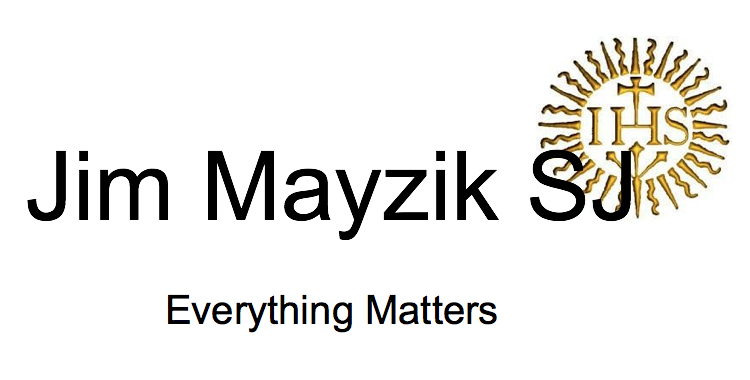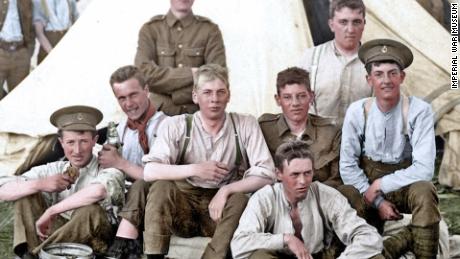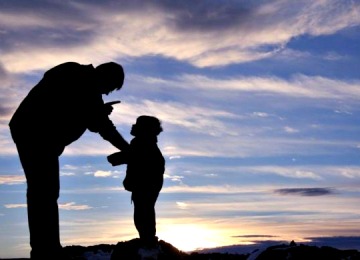This is what love looks like.
7th Sunday C 2/24/19 1Sam26,1Cor 15,Lk6:27-38 J Mayzik SJ
You may have seen the previews for a film that came out around Christmas, and is still in theaters tonight. It’s called They Shall Not Grow Old. The genesis of the film dates to 2014, when the British Imperial War Museum invited Peter Jackson, the director of the “Lord of the Rings” franchise, to make a World War I documentary using the footage in its collection in a unique way. As an experiment Jackson had a few minutes of film digitized, cleaned, slowed down and colorized, and when he saw the footage, he experienced the astonishment that his audiences now experience in his completed movie. The faces of the British soldiers — some as young as 14 — burn into your memory: their youthful innocence at the beginning of the war, their bone-weary cynicism and distrust at the end . The film’s title comes from a poem by Lawrence Binyon, about the English soldiers in World War I;
They went with songs to the battle, they were young,
Straight of limb, true of eye, steady and aglow.
They were staunch to the end against odds uncounted;
They fell with their faces to the foe.
They shall grow not old, as we that are left grow old:
Age shall not weary them, nor the years condemn.
At the going down of the sun and in the morning
We will remember them.
All the horrors of that war are brought amazingly, vividly to life in the digitized film. It is as though it is happening right now in 2019: the destruction of artillery shells, the terror of sniper fire, the constant threat of death, the agony of gas attacks. Soldiers voiceovers described observing their neighbors in the trenches suddenly dying from a sniper’s bullet or a piece of shrapnel, of a skull being “splintered” and a body sheared in half, vertically, front to back, offering an “anatomy lesson.” Others describe the gruesome danger of pits of mud filled with putrefying corpses, into which soldiers slipped and sank to their death.
Somehow, with the footage restored and augmented by modern means, the faces of these men leapt off the screen. For the most part they were just kids, involved to their deaths in a conflict that they didn’t really understand, pawns in a global game of power.
As the movie unfolded, I had two reactions to it all. The first was that everyone I was watching on the screen and everyone I heard in the voice-overs were dead men. Long dead, most of them gone decades ago. The technology had convincingly brought them back to life, but not one of them still took the breath of air.
And secondly, as I watched these savage battle scenes unfold on the screen, I found myself wondering how it was possible that human beings could ever do such things to one another. This was not Hollywood, this was the real, monstrous thing called war.
But perhaps the most poignant scene in the film was the one in which the English soldiers and German soldiers interacted with each other in a ceasefire and at the end of the war. They smiled at one another, they mugged for the camera together, they helped the wounded on both sides together. That scene vehemently indicted the moral hollowness of all war and all hatred of our supposed enemies.
I was with a friend the other day, and he was telling me about how he had caught his firstborn son hitting his little brother one night. He pulled him out of the room, brought him downstairs, and made him stand in the living room to watch as his father vacuumed the rug. When he was done, he shut off the vacuum and told him in no uncertain terms that he was never to raise his hand to his brother again. “I am so angry at you right now for hitting my son,” he said, “but I put my frustration into vacuuming the floor, not into hitting you. Do you understand? But I will tell you this, my son, if you ever raise a hand to your mother, I won’t be vacuuming then.” I have known this young father since he was a bit of a defiant teenager himself, and as I listened to him speak about trying to father his son in a way that is consistent with his faith, I was almost on the verge of tears.
Listen to me. When we are born, we are innocents, vulnerable, we lay there in the crib, our arms open to both the good and the bad of the world. As we grow older, we are taught to protect ourselves for our own survival. People do bad things, people can hurt you, you need to be careful, people will take advantage of you big time. And you learn to protect yourself, to defend yourself, often you learn to be on the offensive, to get them before they get you. It’s the way of the world, it’s the way of all life on earth. Watch a few shows on the Discovery Channel or Animal Planet and you’ll see it over and over. An eye for an eye, a hurt for a hurt, a rejection for a rejection. You’d be a fool to let it be any other way, and only fools suffer gladly.
So then Jesus comes along and tells us to forget about getting even. Tells us to open our arms like a baby and embrace it all anyway. Love conquers everything, he says. Tells us to love even when our love is rejected---especially when our love is rejected. It’s the story we heard in the first reading: David sparing the life of his father-in-law Saul, who was out to kill him in jealousy. David facing hatred with love, and in the end, proving that love conquers all.
Love conquers all. That’s what Jesus is telling us. It’s something new, beyond the lessons of the Animal Planet. Love conquers all, getting even conquers nothing, and in the end doesn’t make us feel better at all. All the blood shed in all the wars that humans have waged…and for what? The sun crosses the horizon, day follows day, year follows year, decade turns into millenium upon millenium. All the combatants and all the powers that set them upon one another? Dust to dust.
Love conquers all, and you know what the proof of that is? Ourselves! In spite of ourselves, in spite of all our nastiness, pettiness, bloody selfishness, the good Father continues to work his own vacuum and win us over with his forgiving love. His love conquers us, and in that love, we conquer every one who doesn’t know that love.
How dare we turn our children into killing machines? How dare we teach them an eye for an eye, a hurt for a hurt, a death for a death?
Have you ever just wanted to get even, to get back at someone who did something to you that you didn’t like, or that was unjust or unfair? Maybe it was a stranger, or maybe it was someone at work, or a friend, or someone in your family, your brother or your sister, or even your parents themselves? All the arguments, the positioning, the conflicts, the defensiveness, the righteousness—all the people who we don’t talk to in our families or school or work, all the shouting on the streets, all the bloodshed in the desert, on the seas, in the mountains, everywhere. Christ crucified, arms open, radically loving all of that, all of us. He did it, could do it because he knew at the very core of his being that he was loved by the one who made him and us. That was his purpose, right there, that. That is what love looks like. Maybe we can try to imitate it today.






